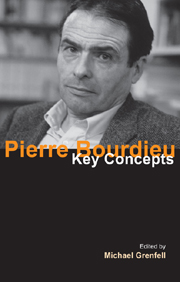Book contents
- Frontmatter
- Contents
- Contributors
- Acknowledgements
- Introduction
- PART I BIOGRAPHY, THEORY AND PRACTICE
- PART II FIELD THEORY: BEYOND SUBJECTIVITY AND OBJECTIVITY
- PART III FIELD MECHANISMS
- 5 Social class
- 6 Capital
- 7 Doxa
- 8 Hysteresis
- PART IV FIELD CONDITIONS
- Conclusion
- Postscript: methodological principles
- Chronology
- Bibliography
- Index
6 - Capital
from PART III - FIELD MECHANISMS
- Frontmatter
- Contents
- Contributors
- Acknowledgements
- Introduction
- PART I BIOGRAPHY, THEORY AND PRACTICE
- PART II FIELD THEORY: BEYOND SUBJECTIVITY AND OBJECTIVITY
- PART III FIELD MECHANISMS
- 5 Social class
- 6 Capital
- 7 Doxa
- 8 Hysteresis
- PART IV FIELD CONDITIONS
- Conclusion
- Postscript: methodological principles
- Chronology
- Bibliography
- Index
Summary
Introduction
The first task of this chapter is to describe capital it in its general symbolic form rather than its specific types such as “cultural”, “social”, “linguistic”, “scientific”, etc. I first address what is distinctive about Bourdieu's use of the term and the manner in which it functions within his theory.
Usually the term “capital” is associated with the economic sphere and monetary exchange. However, Bourdieu's use of the term is broader:
It is in fact impossible to account for the structure and functioning of the social world unless one reintroduces capital in all its forms and not solely in the one form recognized by economic theory. Economic theory has allowed to be foisted upon it a defi- nition of the economy of practices which is the historical invention of capitalism; and by reducing the universe of exchanges to mercantile exchange, which is objectively and subjectively oriented toward the maximization of profit, i.e., (economically) self-interested, it has implicitly defined the other forms of exchange as non-economic, and therefore disinterested. In particular, it defines as disinterested those forms of exchange which ensure the transubstantiation whereby the most material types of capital – those which are economic in the restricted sense – can present themselves in the immaterial form of cultural capital or social capital and vice versa.
(Bourdieu 2006: 105–6)Hence, Bourdieu's purpose is to extend the sense of the term “capital” by employing it in a wider system of exchanges whereby assets of different kinds are transformed and exchanged within complex networks or circuits within and across different fields.
- Type
- Chapter
- Information
- Pierre BourdieuKey Concepts, pp. 101 - 118Publisher: Acumen PublishingPrint publication year: 2008
- 98
- Cited by

